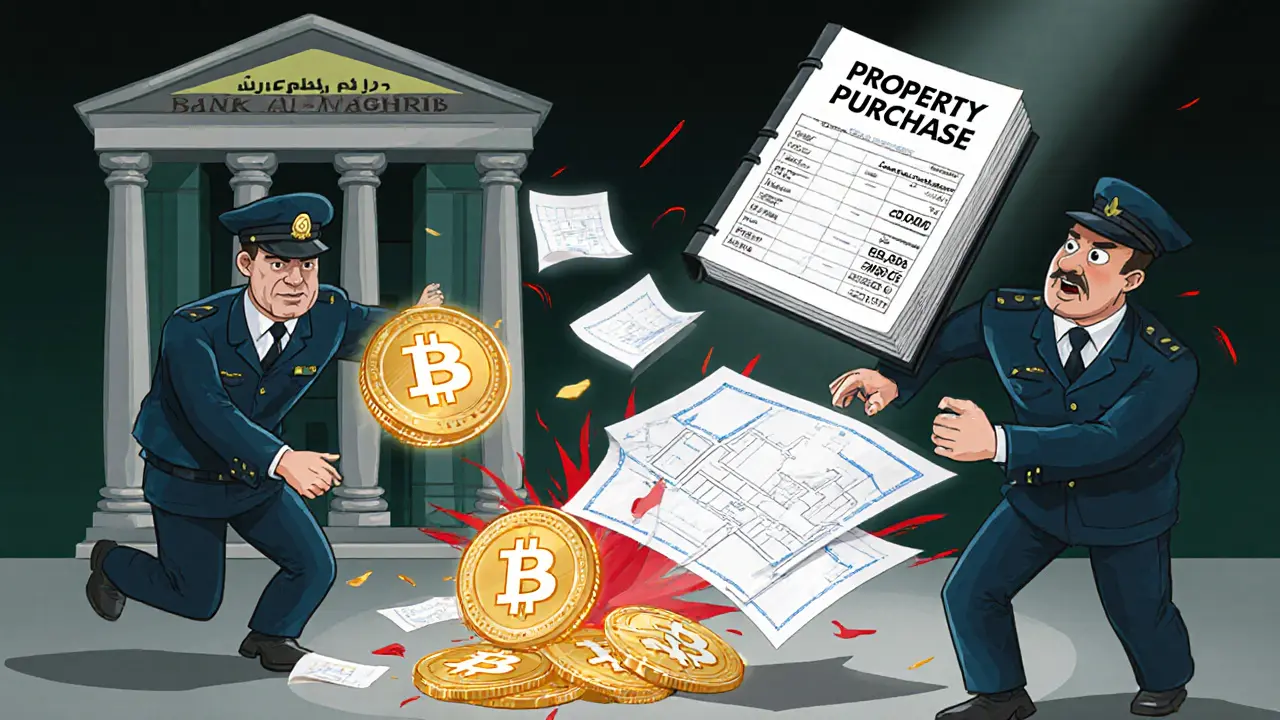
Morocco Crypto Penalty Calculator
Potential Penalties
Important Notice
This calculator provides estimates based on current Moroccan regulations and the proposed 2025 framework. Actual penalties may vary depending on specific circumstances, severity of violation, and enforcement discretion.
Always consult with a qualified attorney or tax advisor for personalized advice regarding crypto compliance in Morocco.
Current Penalty Structure
Individuals
Fines range from MAD 20,000 to MAD 100,000 ($2,000 - $10,000)
Repeat offenses may lead to criminal proceedings under financial crime statutes.
Companies
Maximum fine of MAD 500,000 ($50,000)
Criminal charges may also be filed for repeat violations.
Proposed 2025 Framework
Individuals
Capital gain tax of 15-30% on profits
Standard tax evasion penalties may apply (up to 3x unpaid tax)
Companies
Corporate tax of 20-31% on crypto-related income
Potential license revocation and criminal charges for fraud
Compliance Checklist
Want to know what can happen if you trade digital coins in Morocco? The country moved from a total ban in 2017 to a draft regulatory framework in 2024, but the old fines are still on the books until the new law kicks in. Below you’ll find the essential facts, the current penalties, what the upcoming rules will look like, and a quick checklist to keep your crypto activities on the right side of the law.
TL;DR - Quick Takeaways
- Unauthorized crypto trading can bring fines of MAD20,000-100,000 for individuals and up to MAD500,000 for companies.
- Repeat offenses may lead to criminal proceedings.
- From 2025 a draft law will require licensing through Bank Al‑Maghrib and impose tax rates of 15‑30% on capital gains.
- Non‑compliance after the law takes effect could trigger tax‑evasion penalties or license revocation.
- Use the compliance checklist at the end to avoid the biggest pitfalls.
1. Legal Background - From Prohibition to Draft Regulation
In November2017 the Moroccan Ministry of Economy and Finance declared any cryptocurrency transaction illegal under the country’s foreign‑exchange rules. The ban made Morocco one of the few nations with a blanket prohibition, pushing most trading underground.
That stance began to shift in November2024 when Abdellatif Jouahri, governor of Bank Al‑Maghrib, announced a draft law that would legalise and regulate crypto assets. The proposal calls for licensed exchanges, mandatory AML/CFT programs, and tax reporting. While the bill is still under parliamentary review, the existing penalty regime remains enforceable until the law is enacted, likely sometime in 2025.
2. Current Penalty Regime - What Happens If You’re Caught
The penalty structure is codified in Morocco’s financial laws and applies to any individual or entity that engages in unauthorised crypto activities, including:
- Trading on unlicensed platforms.
- Using digital assets for commercial payments.
- Operating a crypto‑exchange without Bank Al‑Maghrib approval.
Individual fines range from MAD20,000 to MAD100,000 (≈$2,000‑$10,000). Corporate fines can reach up to MAD500,000 (≈$50,000). The law also empowers authorities to open criminal proceedings for repeat offenders, which could mean imprisonment under broader financial crime statutes.
Enforcement actions have targeted high‑profile cases. In February2025, investigators focused on people who used Bitcoin, Ethereum, Tether, Litecoin, or Ripple to buy property, treating those transactions as attempts to bypass foreign‑exchange controls.

3. Recent Enforcement Focus - Real‑Estate and KYC Violations
The crackdown isn’t limited to exchanges. Authorities monitor any use of crypto that resembles a payment channel. Notable enforcement trends include:
- Property purchases with crypto - treated as illegal foreign‑exchange conversion.
- Peer‑to‑peer platforms that lack Know‑Your‑Customer (KYC) checks.
- Businesses attempting to settle invoices with digital assets.
These actions illustrate a focus on anti‑money‑laundering compliance. The Moroccan Tax Administration (DGI) works alongside Bank Al‑Maghrib to enforce violations.
4. The Draft 2025 Framework - Licensing, AML/CFT and Taxation
Should the draft become law, the penalty landscape will change dramatically:
| Aspect | Current (2023‑2025) | Proposed 2025 Regime |
|---|---|---|
| Legal status | Fully prohibited | Legal with mandatory licence |
| Individual fines | MAD20,000‑100,000 | Tax on gains 15‑30% + standard tax‑evasion fines |
| Corporate fines | MAD500,000 | Corporate tax 20‑31% on crypto‑related income |
| Enforcement tool | Monetary fine, criminal case for repeat | License revocation, tax penalties, possible criminal case for fraud |
Key requirements under the draft:
- Obtain a crypto‑exchange licence from Bank Al‑Maghrib.
- Implement robust Anti‑Money‑Laundering (AML) and Countering the Financing of Terrorism (CFT) procedures.
- Report all crypto transactions to the Moroccan Tax Administration (DGI) for annual tax filings.
- Pay capital‑gain tax at 15‑30% (mirroring securities tax) and apply personal income‑tax brackets (10‑38%) on net profits.
Failure to meet these obligations would likely trigger the standard tax‑evasion penalties defined in Moroccan law-typically fines equal to three times the unpaid tax plus possible imprisonment.
5. Practical Compliance Checklist - Staying Safe Until the Law Changes
Even though the new framework isn’t official yet, you can reduce risk by following these steps:
- Stop using unlicensed platforms. If you already have crypto on a peer‑to‑peer site, consider moving it to a personal wallet that you control.
- Document every transaction. Keep screenshots, dates, amounts (in MAD), and counterparties. This record will be essential for any future tax filing.
- Understand KYC requirements. Any service that asks for ID, address, or source‑of‑funds info is moving toward compliance - use those platforms.
- Separate personal and business crypto. If you run a company, open a dedicated corporate wallet and treat crypto profits as regular corporate income.
- Monitor regulatory updates. The draft is expected to pass sometime in 2025; watch announcements from Bank Al‑Maghrib and the Moroccan Capital Market Authority (AMMC).
- Consider professional advice. A tax consultant familiar with Moroccan law can help you calculate provisional tax liabilities and avoid surprise fines.
6. Future Outlook - What to Watch for in 2025‑2026
Morocco’s crypto market is sizable - estimates put the 2025 market at USD278.7million, with growth projected into 2026. The government’s interest in a Central Bank Digital Currency (CBDC) also signals a willingness to engage with digital assets. If the draft law passes, you can expect:
- Legitimate exchange platforms offering Moroccan‑dirham pairs.
- Greater institutional participation, especially from banks testing CBDC pilots.
- More detailed guidance on tokenised securities from the AMMC.
Until then, the safest route is to treat crypto as a prohibited activity and avoid any commercial use that could be interpreted as bypassing foreign‑exchange rules.

Frequently Asked Questions
What are the exact fines for an individual caught trading crypto?
The law sets a range of MAD20,000 to MAD100,000 (about $2,000‑$10,000). The exact amount depends on the severity of the breach and whether the offender is a repeat violator.
Can I still use Bitcoin to buy a house?
No. Using crypto for property purchases is considered a way to evade foreign‑exchange controls and can lead to both the monetary fine and a criminal investigation, as seen in the February2025 enforcement wave.
When will the new crypto regulation take effect?
The draft law is slated for parliamentary adoption in 2025. Once enacted, a transition period of up to six months is expected before licences and tax reporting become mandatory.
What tax rate applies to crypto capital gains?
Under the proposed framework, capital‑gain tax will align with securities tax at 15‑30%. The exact rate depends on your total taxable income and the holding period.
Is there any safe way to trade crypto in Morocco right now?
The only fully legal method would be to wait for the licensing regime to be official. Until then, the safest approach is to keep crypto in a personal, non‑trading wallet and avoid any commercial transactions.


Comments
Cyndy Mcquiston
Just don't touch it. Period.
Manish Gupta
Bro I bought ETH in 2021 and still hold it in my wallet... no trading, no selling. Just HODLing. 😅
Abby Gonzales Hoffman
This is actually one of the clearest breakdowns I've seen on Moroccan crypto law. The checklist? Gold. Seriously, if you're holding crypto there, document everything. Even if it's illegal now, when the law changes you'll be glad you kept receipts. Trust me, I've seen people get burned by assuming 'not enforced' means 'not illegal'.
olufunmi ajibade
As someone from Nigeria where crypto is a lifeline for small businesses, I get why Morocco is cautious. But banning it outright? That just pushes people into gray zones. Licensing and taxation? That's the real path forward. The government needs to stop treating crypto like a threat and start seeing it as a tool - especially for the unbanked.
Rampraveen Rani
If you're using crypto to buy property in Morocco you're asking for trouble 😳
Natasha Nelson
I... I just don't know what to do anymore. I mean, I have some Bitcoin. I didn't even know it was illegal. Now I'm scared to even look at my wallet. What if they come after me? I'm just a nurse. I didn't hurt anyone.
Prabhleen Bhatti
The 15-30% capital gains tax under the new framework? That's actually reasonable - aligns with securities. But what about mining? Is it even addressed? And what about DeFi staking? The DGI hasn't clarified if yield is treated as income or capital. This draft is still dangerously vague in places. Someone needs to push for a public consultation window.
Richard Williams
You're not alone, Natasha. A lot of people are in your position. The key is: don't panic, don't trade, don't cash out. Just keep your wallet secure and your records clean. When the law changes, you'll have a clean slate. This isn't about punishment - it's about transition. And you're already ahead by being aware.
Alex Horville
Morocco's got more to lose than gain here. Crypto's a tool for Western elites to bypass African sovereignty. Let them keep their digital toys. We don't need it.
William Burns
The fact that this post even exists suggests a worrying normalization of financial subversion. Cryptocurrencies are inherently destabilizing to state monetary authority. The notion that one should ‘prepare’ for legalization is tantamount to endorsing anarchy in fiscal policy. This is not innovation - it is erosion.
Ashley Cecil
It is imperative to note that the use of unregulated digital assets constitutes a direct violation of Article 14 of the Moroccan Foreign Exchange Code, as amended. Furthermore, any attempt to circumvent Know-Your-Customer protocols is not merely non-compliant - it is criminally negligent. One cannot selectively adhere to financial regulations based on personal convenience.
Sarah Hannay
I understand the fear, but I also see the logic in Morocco’s stance. The financial system isn't just about money - it's about trust. If you allow untraceable transactions to flow freely, you open the door to exploitation. The draft law isn't about crushing innovation - it's about protecting ordinary citizens from fraud, laundering, and predatory platforms. We need structure, not chaos.
Joseph Eckelkamp
Ah yes, the classic ‘regulate it so we can tax it’ playbook. Brilliant. First they ban it, then they tax it, then they mandate it, then they take your private keys with ‘national security’ as the excuse. Welcome to the future, where your wallet is a bank account with extra steps and more paperwork. 🙃
Jennifer Rosada
Honestly, if you're still holding crypto in Morocco, you're either incredibly naive or actively trying to break the law. You think the government doesn't know who you are? They track blockchain addresses. They cross-reference property deeds. You're not some anonymous ghost - you're a data point in a spreadsheet. And when the law changes, you'll be the first one they come for.
ashish ramani
I keep my crypto in a hardware wallet. No trading. No selling. Just holding. I'm not trying to evade anything. I'm just preserving value. I don't see how that's wrong.
Elizabeth Mitchell
I live in the US but my cousin in Casablanca just told me she sold her crypto last week to buy a fridge. I asked if she was worried. She laughed and said, 'They never catch anyone.' Maybe they don't... but that doesn't mean it's safe.
Chris Houser
I've seen this play out in Nigeria. First they ban it. Then people use it anyway. Then they try to tax it and everyone panics. The real solution? Build bridges, not walls. Let licensed exchanges operate. Let people pay taxes on gains. But don't pretend banning it will make it disappear - it just makes it riskier.
John E Owren
If you're holding crypto and not using it for transactions, you're not breaking the law. You're just sitting on it. The ban targets commercial activity - not personal storage. Don't confuse the two. Keep your wallet secure, don't trade, and you'll be fine until the law changes.
Gabrielle Loeser
While the regulatory framework remains provisional, it is incumbent upon all individuals to adhere strictly to existing statutes. The proposed changes, though potentially beneficial, do not retroactively legitimize prior conduct. One must act with prudence, not presumption, in matters of financial law.